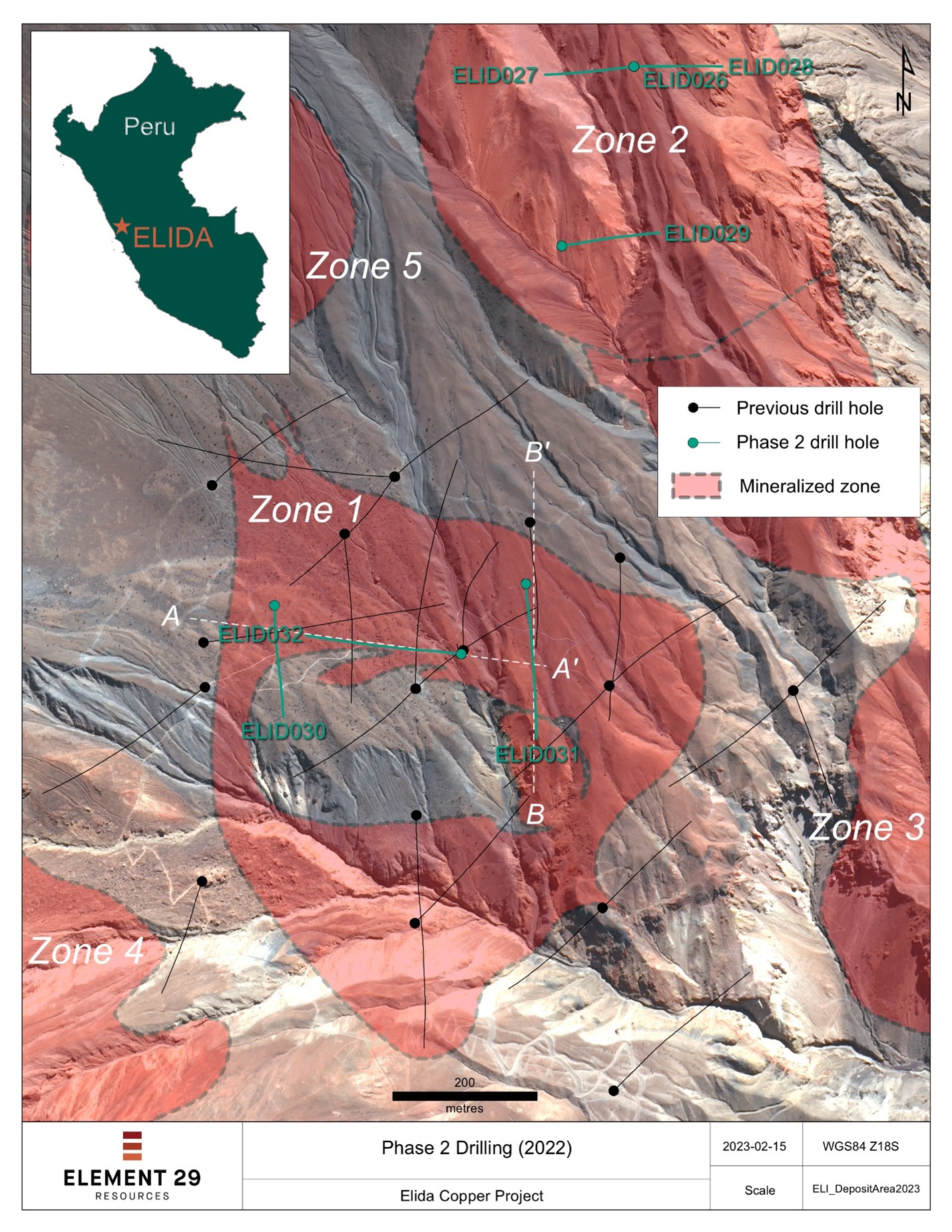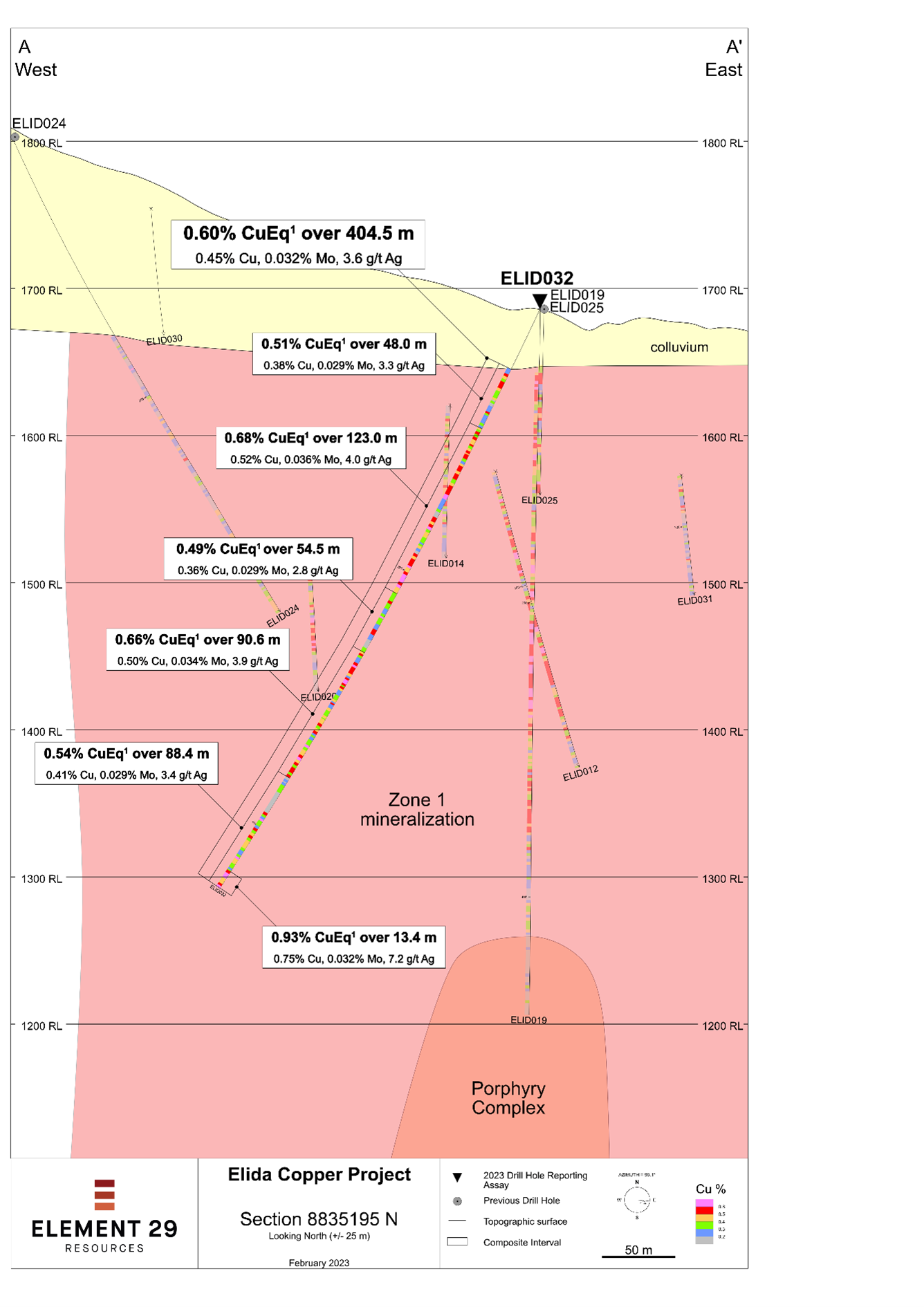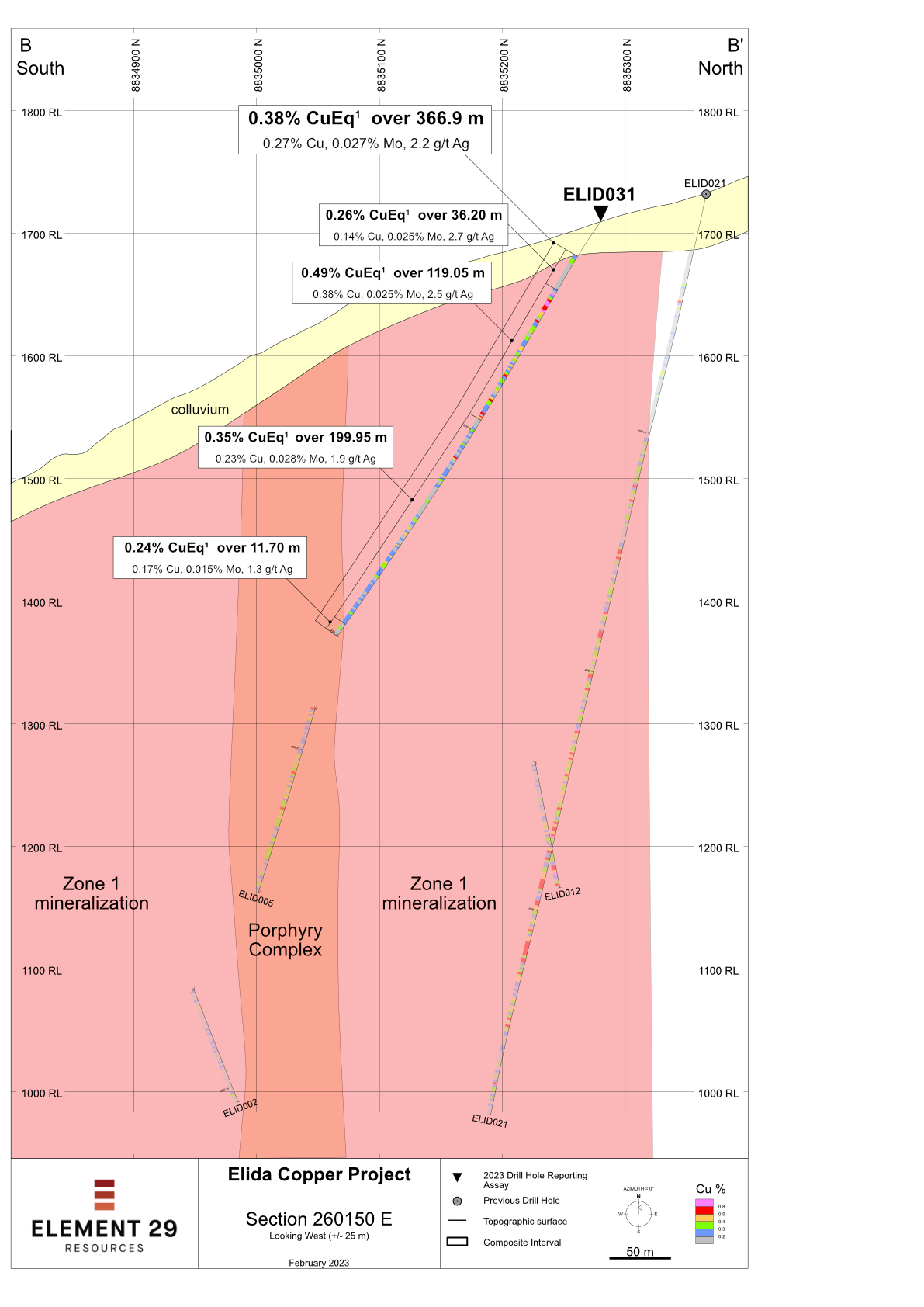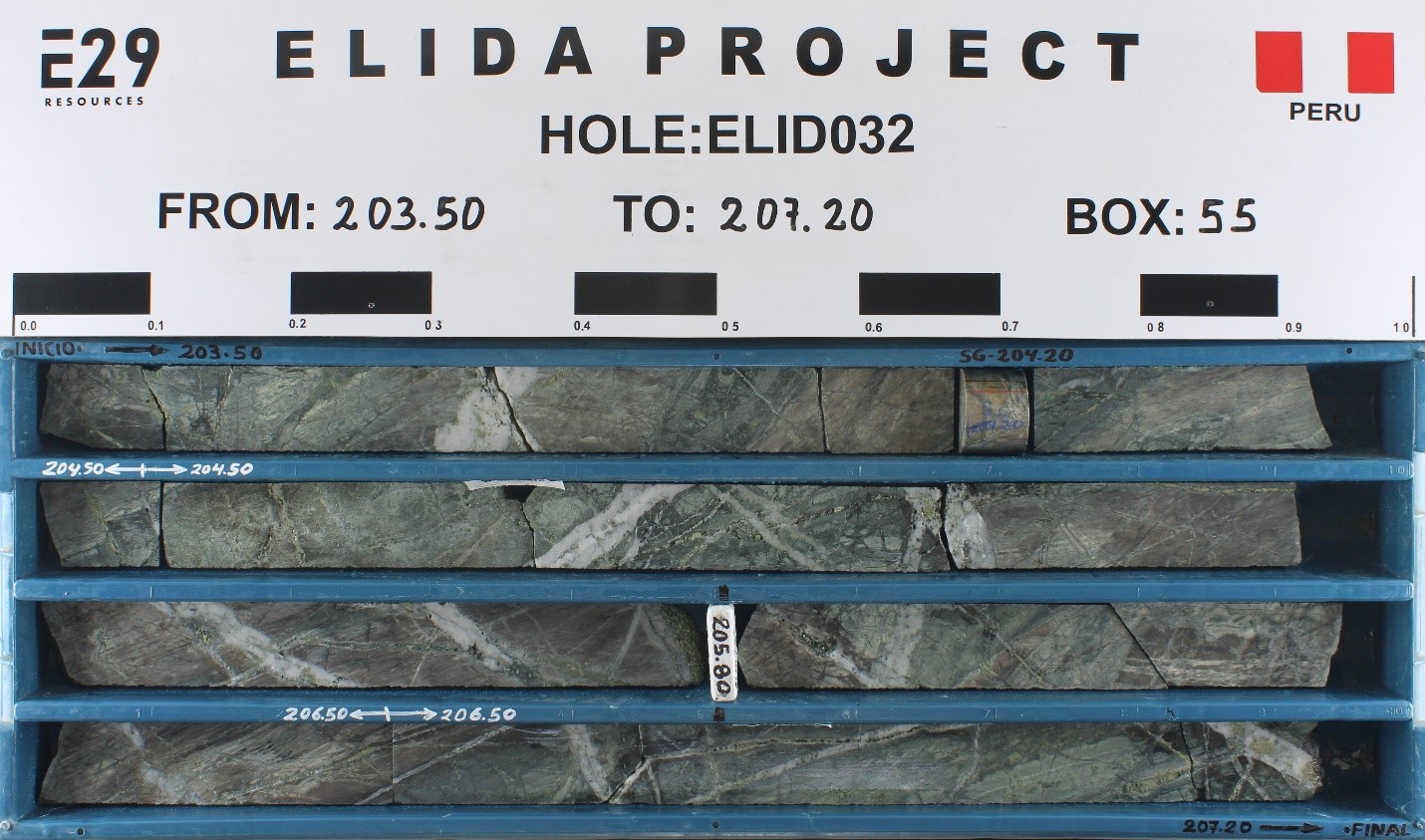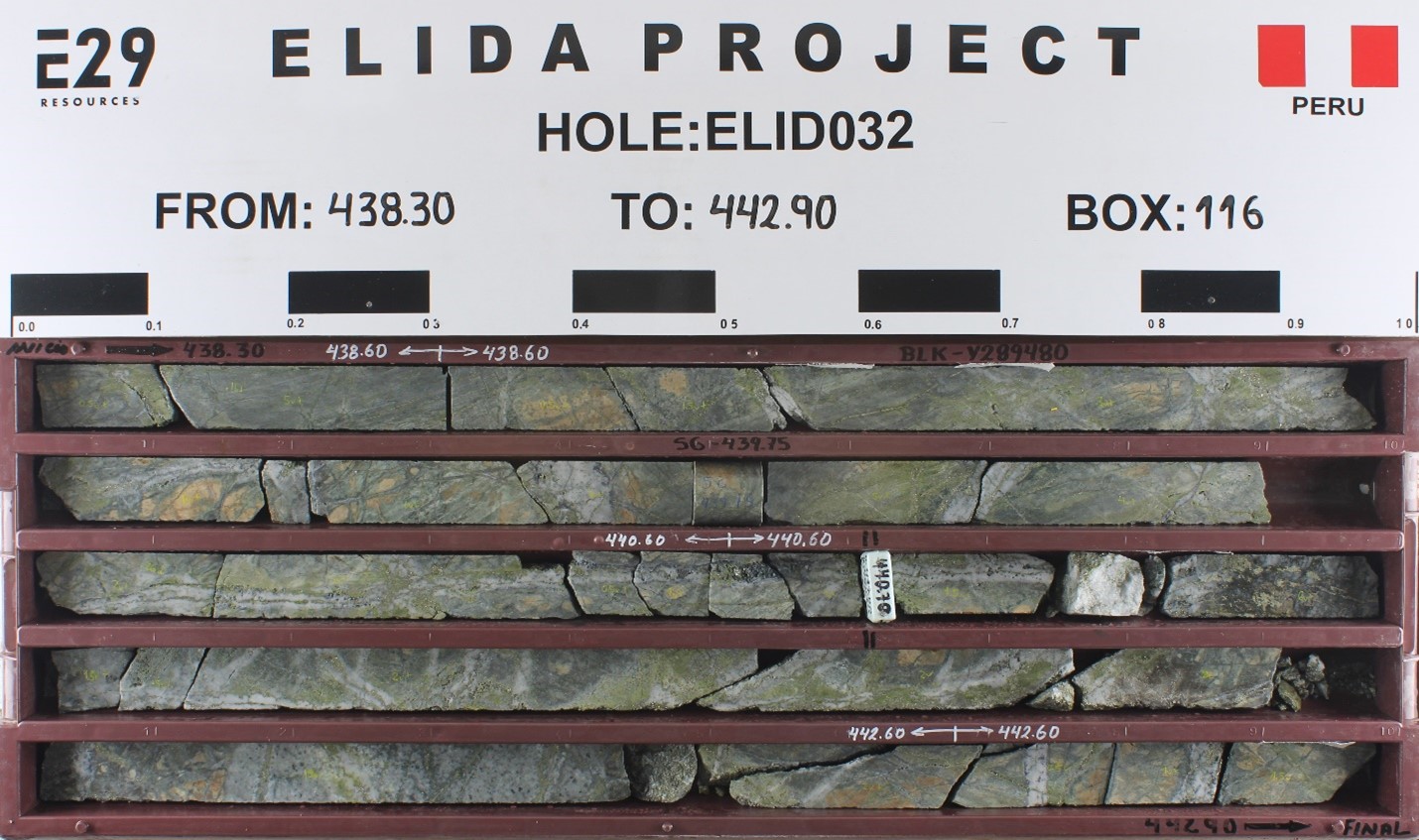Element 29 Announces Results from Elida Phase 2 Drill Program including 404.5 metres of 0.60% CuEq1
Vancouver, Canada, March 6, 2023 – Element 29 Resources Inc. (“Element 29” or the “Company”) (TSX-V: ECU | OTCQB: EMTRF | BVL: ECU) announces results from the 2,043-metre (“m”) Phase 2 drill program at its 100% owned Elida Copper Project (“Elida” or “the Project”) located in central Peru (Figure 1).
Elida Drilling Highlights
- Drill hole ELID032 intersected 404.5 m of 0.45% copper (“Cu”), 0.032% molybdenum (“Mo”), and 3.6 g/t silver (“Ag”) for 0.60% copper equivalent1 (“CuEq”, see footnote 1 in Table 1), including 123.0 m of 0.52% Cu, 0.036% Mo and 4.0 g/t Ag for 0.68% CuEq1 starting from the bedrock surface at 45.5 m depth (Figure 2).
- Drill hole ELID031 returned a longer than expected intersection of 366.9 m of 0.27% Cu, 0.027% Mo, and 2.2 g/t Ag for 0.38% CuEq1 (Figure 3), including a 119.1 m interval of 0.38% Cu, 0.025% Mo, and 2.5 g/t Ag for 0.49% CuEq1.
Steve Stakiw, President and CEO, comments, “The Phase 2 drill results from Elida have further boosted our understanding and confidence in the Zone 1 porphyry copper deposit that hosts our initial mineral resource estimate. The program also further confirmed the consistency and continuity of copper mineralization within the Zone 1 resource shell, specifically with hole ELID032 delivering a long, continually mineralized interval of copper averaging above our resource grade as well as ending in mineralization grading 0.75% Cu, 0.032% Mo, 7.2 g/t Ag (0.93% CuEq1).”
The Elida Phase 2 drilling program was designed to evaluate the continuity of Zone 1 mineralization along strike and between widely spaced drill holes completed in Phase 1, and to provide better resolution on the position of the porphyry complex occupying the centre of Zone 1. A secondary objective was to complete initial drill testing of Zone 2 (Figure 1).
Table 1: Length-weighted assay intervals for holes ELID030, ELID031, and ELID032.
| Hole | From | To | Length2 | Cu | Mo | Ag | As | CuEq1 |
| (%) | (%) | (g/t) | (g/t) | (%) | ||||
| ELID032 | 45.50 | 450.00 | 404.50 | 0.45 | 0.032 | 3.6 | 23 | 0.60 |
| includes | 45.50 | 93.50 | 48.00 | 0.38 | 0.029 | 3.3 | 14 | 0.51 |
| includes | 93.50 | 216.50 | 123.00 | 0.52 | 0.036 | 4.0 | 10 | 0.68 |
| includes | 216.50 | 271.00 | 54.50 | 0.36 | 0.029 | 2.8 | 9 | 0.49 |
| includes | 271.00 | 361.60 | 90.60 | 0.50 | 0.034 | 3.9 | 56 | 0.66 |
| includes | 361.60 | 450.00 | 88.40 | 0.41 | 0.029 | 3.4 | 22 | 0.54 |
| and includes | 436.60 | 450.00 | 13.40 | 0.75 | 0.032 | 7.2 | 26 | 0.93 |
| ELID031 | 34.10 | 401.00 | 366.90 | 0.27 | 0.027 | 2.2 | 22 | 0.38 |
| includes | 34.10 | 70.30 | 36.20 | 0.14 | 0.025 | 2.7 | 49 | 0.26 |
| includes | 70.30 | 189.35 | 119.05 | 0.38 | 0.025 | 2.5 | 24 | 0.49 |
| includes | 189.35 | 389.30 | 199.95 | 0.23 | 0.028 | 1.9 | 17 | 0.35 |
| includes | 389.30 | 401.00 | 11.70 | 0.17 | 0.015 | 1.3 | 6 | 0.24 |
| ELID030 | 144.25 | 300.30 | 156.05 | 0.13 | 0.033 | 1.1 | 14 | 0.26 |
| ELID029 | - | - | - | nsv | ||||
| ELID028 | - | - | - | nsv | ||||
| ELID027 | - | - | - | nsv | ||||
| ELID026 | - | - | - | nsv |
- Copper equivalent grades (CuEq) are for comparative purposes only. Calculations are uncut and recovery is assumed to be 100% as metallurgical data is insufficient to allow for estimation of metal recoveries. Copper equivalence (CuEq %) is calculated as: CuEq (%) = Cu (%) + [3.6027 × Mo (%)] + [0.0084 × Ag (g/t)], utilizing metal prices of Cu - US$3.75/lb, Mo - US$13.51/lb and Ag - US$21.63/oz. Metal prices are based on long-term consensus average prices (Bloomberg, S&P Capital IQ, broker research, Canaccord Genuity Corp., March 1, 2023).
- Intervals are downhole drilled core lengths. Drilling data to date is insufficient to determine true width of mineralization. Assay values are uncut.
ELID032 was drilled to examine the west and depth continuity of an internal higher-grade zone intersected by drill holes ELID014, ELID020, and ELID024. Results from this hole show higher grade mineralization persists west and north of the higher-grade mineralization intersected by ELID020. The style of mineralization was similar to surrounding holes with chalcopyrite as the copper-bearing sulphide species (Images 1 and 2). Importantly, only minor intervals of late-mineral porphyry dikes were encountered, meaning there is minimal dilution from lower-grade porphyry units in the northern segment of Zone 1. The drill hole, which was terminated for operational reasons, ended in mineralization at a depth of 450.0 m in mineralization grading 0.75% Cu, 0.032% Mo, 7.2 g/t Ag (0.93% CuEq1). See Figure 2.
ELID031 was positioned east of the higher-grade zones intersected by holes ELID012, ELID019, and ELID025 and on the same section as ELID021. The objective was to obtain an intersection above the mineralization in ELID021 and determine the position of the porphyry complex central to Zone 1. ELID021, drilled in Phase 1, was collared near the northern boundary of Zone 1 and extended south toward the porphyry complex, but was unable to intersect the contact due to drilling equipment limitations. ELID031 was intended to intersect the part of Zone 1 between the end of ELID021 and the porphyry. The hole successfully intersected lower grade mineralization characteristic of the porphyry complex and was terminated in mineralized porphyry phases. The porphyry complex was approximately 100 m further south than was predicted from previous sparse drilling information. See Figure 3.
ELID030 was located on the west side of Zone 1 to determine if the higher-grade mineralization in ELID020 continued to the west. The drill hole penetrated thick, unconsolidated colluvial cover and intersected a short interval of weakly mineralized sedimentary host rock before entering the lower-grade porphyry complex at the centre of Zone 1. The hole demonstrated that the porphyry complex is not a simple elliptical shape as interpreted previously. Geologic evidence from the drilling shows that the porphyry complex was emplaced into well-mineralized sedimentary host rock. Current drilling information suggests the internal higher-grade mineralized zone is displaced to the south by intrusion of the porphyry complex, which is supported by hole ELID020 on the north side of the porphyry complex and hole ELID023 on the south side of the porphyry complex. Further drilling will be required in this area to constrain the position of the porphyry complex and the internal higher-grade zone.
Zone 2 was tested with three (3) drill holes (ELID027, ELID028, and ELID029) positioned near strongly leached exposures of intensely altered and veined porphyry and sedimentary wall rock. Note, the first hole (ELID026) was lost at a depth of 117.7 m and the second attempt was successful at reaching the target depth. All drill holes intersected variably altered sedimentary and volcanic host rocks. Potassic (hydrothermal k-feldspar and biotite) alteration in both porphyry and wall rock was overprinted by phyllic (quartz-sericite-pyrite) alteration. However, only traces of chalcopyrite were present, and the holes returned no significant copper values. Preliminary interpretation of results suggests the holes are located along the poorly mineralized upper boundary of the potassic zone. The initial drilling does not discount the existence of mineralization at depth. However, more work is necessary to develop a deeper drill target. Given that drilling shows Zone 1 copper mineralization ends abruptly with potassic alteration extending for 50-70 m past the mineralized boundary, it is permissive for a mineralized zone to exist at a reasonable depth.
Results from the Phase 2 drilling program improved our understanding of the continuity of mineralization within Zone 1 and increased confidence in the existence of a near-surface, higher-grade zone. Furthermore, results from Phases 1 and 2 show the northern segment of Zone 1 has a horizonal width of at least 250 m, which contributes to a low potential strip ratio. Drill holes from Zone 2 intersected alteration and veining consistent with outcrops in the area but did not intersect significant copper mineralization. This does not discount the possibility of the existence of mineralization at depth, but on-going interpretation of available exploration data needs to be completed to develop drill targets.
Future Work
The Company plans to use information from the Phase 1 and 2 programs coupled with more detailed surface mapping to design follow-up drilling programs to explore the internal structure of Zone 1 and develop drill targets on the other four zones. Drilling has provided samples of mineralization that can be used for preliminary metallurgical test work. A program involving preliminary metallurgical testing is planned.
Analytical Quality Control & Quality Assurance
Elida Resources S.A.C., a wholly owned subsidiary of Element 29 Resources Inc., supervises drilling and carries out sampling of NQ and HQ core. Logging and sampling are completed at a secured Company facility situated near the Elida project site. Sample intervals are nominally 2 m long. Drill core is cut in half using a rotary diamond blade saw and samples are sealed on site before transportation to the ALS Peru S.A.C. independent laboratory in Lima by Company vehicles and staff. Samples are analyzed for 35 elements using an Aqua Regia digestion and ICP-AES analysis (ME-ICP41). Samples reporting over limits are analyzed by Aqua Regia digestion with ICP-AES finish (ME-OG46). ALS meets all requirements of International Standards ISO/IEC 17025:2005 and ISO 9001:2015 for analytical procedures.
Element 29 employs an independent, internal quality assurance/quality control program that includes insertion of duplicate, blank, and certified reference samples at the field site. The Company is not aware of any drilling, sampling, recovery, or other factors that could materially affect the accuracy or reliability of the data reported.
Qualified Person
The scientific and technical content of this press release has been reviewed and approved by Paul J. Johnston (PhD, PGeo), who is Vice President of Exploration for Element 29 and is a “Qualified Person” as defined in National Instrument 43-101 Standards of Disclosure for Mineral Projects.
About Elida
Elida is a porphyry copper-molybdenum exploration project within a property composed of 28 mining concessions totaling 19,210 hectares that are 100% owned by Elida Resources S.A.C., a Peruvian subsidiary of Element 29. The property contains a large, 2.5 x 2.5 kilometre (“km”) alteration system enclosing a cluster of porphyry centres that represent five distinct exploration targets. In 2022, Element 29 completed seven drill holes totalling 2043.1 m to supplement Phase 1 drilling, which intersected multiple, long intervals of Cu-Mo-Ag mineralization and traced mineralization to a depth greater than 900 m. Mineralization remains open at depth.
The Project is located in west-central Peru approximately 85 km inland from the Pacific coast at moderate elevations between 1,500 m and 2,000 m and close to transportation and power infrastructure, including a 45 mega-watt hydroelectric generation facility situated 15 km from the project.
Elida has an inferred mineral resource estimate of 321.7 million tonnes grading 0.32% copper (for a total of 2.24 billion pounds of contained copper), plus 0.029% molybdenum and 2.6 g/t silver with a low modeled strip ratio of 0.74:1 (at 0.20% copper cut off grade) on the Zone 1 porphyry.
Information on the mineral resource estimate is available in the technical report, available on the Company’s website and on SEDAR, entitled “NI 43-101 Technical Report, Mineral Resource Estimation of the Elida Porphyry Copper Project in Peru” with an effective date of September 20, 2022 and prepared in accordance with Form 43-101F1 by Marc Jutras, PEng MASc, Principal, Mineral Resources, Ginto Consulting Inc., a Qualified Person as defined in National Instrument 43-101 Standards of Disclosure for Mineral Projects, who is independent of Element 29 Resources Inc.
Neither the TSX Venture Exchange nor its Regulation Service Provider (as that term is defined in the policies of the TSX Venture Exchange) accepts responsibility for the adequacy or accuracy of this press release.
About Element 29 Resources Inc.
Element 29 Resources Inc. is an emerging copper exploration and development company focused on advancing its portfolio of Peruvian projects towards development in one of the world’s more established mining jurisdictions. Element 29’s growth strategy is led by our strong board and management, who have a proven track record of discovery and delivering significant value to shareholders.
The Company’s principal objective is to explore and develop its Elida Porphyry Copper Deposit in west-central Peru and its Flor de Cobre Porphyry Copper Project located in the Southern Peru Copper Belt, 26 km southeast from Freeport-McMoRan’s Cerro Verde copper mine. Both projects are well located for potential mine development and will benefit from nearby infrastructure including roads, powerlines, ports, water, and a skilled workforce. More information is available at www.e29copper.com.
For more information:
Steve Stakiw, President & CEO
1-888-246-7881
[email protected]
Figure 1. Plan view showing the locations Phase 2 drill holes completed in Q4-2022. The locations of sections shown in Figure 2 and Figure 3 are indicated by white dashed lines.
Figure 2. A west-oriented section containing drill hole ELID032, which intersected 404.5 m of 0.45% Cu, 0.032% Mo, and 3.6 g/t Ag for 0.60% CuEq1. The hole was continuously mineralized from the bedrock surface at a depth of 45.5 m to the end of the hole at 450.0m. Refer to Figure 1 for the section location.
1 See footnote in Table 1 for explanation of CuEq.
Figure 3. A north-oriented section containing hole ELID031, which intersected 366.9 m of 0.27% Cu, 0.027% Mo, and 2.2 g/t Ag for 0.38% CuEq1. ELID031 tested Zone 1 mineralization located 400 to 500 m above and south of ELID021. The hole encountered mineralization from the bedrock surface to the end of the hole. Copper mineralization above 0.2% Cu overprints porphyry phases on this section.
1 See footnote in Table 1 for explanation of CuEq.
Table 2: Drill hole collar locations for the Phase 2 program.
| Hole ID | East | North | Elev (m) |
EOH (m) |
Azimuth (degrees) |
Dip (degrees) |
| ELID026 | 260300 | 8836000 | 1948 | 117.7 | 090 | -65 |
| ELID027 | 260300 | 8836000 | 1948 | 272.6 | 272.6 | -65 |
| ELID028 | 260300 | 8836000 | 1948 | 250.6 | 250.6 | -60 |
| ELID029 | 260200 | 8835750 | 1835 | 250.9 | 080 | -60 |
| ELID030 | 259800 | 8835250 | 1777.5 | 300.3 | 180 | -60 |
| ELID031 | 260150 | 8835280 | 1709.5 | 401.0 | 180 | -60 |
| ELID032 | 260059 | 8835182 | 1686 | 450.0 | 277 | -65 |
Coordinates are in WGS84 zone 18S UTM
Image 1. An example of porphyry style mineralization from hole ELID032. Strong, multiphase veinlets are developed in feldspathic sandstone host rock. Multiple generations of quartz and sulphide veinlets are visible. Hydrothermal potassium feldspar and biotite reveal a potassic environment of formation. Samples pertaining to core in this box are: 202.5-204.5 m, 0.85% Cu, 0.022% Mo, 6.0 g/t Ag; 204.5-206.5 m, 0.89% Cu, 0.029% Mo, 6.3 g/t Ag; 206.5-208.5 m, 0.85% Cu, 0.047% Mo, 5.8% Ag. Core is HQ diameter (63.5 mm).
Image 2. An example of porphyry style mineralization from hole ELID032. Strong, multiphase veinlets are developed in calcareous sandstone host rock. Carbonate-bearing host rocks result in a skarn alteration assemblage of garnet and diopside, which is consistently overprinted by all mineralized vein phases. Multiple generations of quartz (A and B types) and sulphide veinlets are visible. Hydrothermal potassium feldspar and biotite replacing primary sedimentary minerals reveal a potassic environment of formation. Samples pertaining to core in this box are: 436.6-438.6 m, 0.77% Cu, 0.038% Mo, 5.4 g/y Ag; 438.6-440.6 m, 0.89% Cu, 0.048% Mo, 7.4 g/t Ag; 440.6-442.6 m, 1.02% Cu, 0.029% Mo, 12.2 g/t Ag; 442.6-444.6 m, 0.49% Cu, 0.092% Mo, 4.6 g/t Ag. Core is NQ diameter (47.6 mm).
Forward Looking Statements
This press release contains certain forward-looking information and forward-looking statements within the meaning of applicable Canadian securities legislation (collectively, “Forward-looking Statements”). All statements, other than statements of historical fact, constitute Forward-looking Statements. Words such as “will”, “intends”, “proposed” and “expects” or similar expressions are intended to identify Forward-looking Statements. Forward looking Statements in this press release include statements related the Company’s resource properties, and the Company’s plans, focus and objectives.
Forward-looking Statements involve various risks and uncertainties and are based on certain factors and assumptions. There can be no assurance that such statements will prove to be accurate, and actual results and future events could differ materially from those anticipated in such statements. Important factors that could cause actual results to differ materially from the Company's expectations include uncertainties related to fluctuations in copper and other commodity prices, uncertainties inherent in the exploration of mineral properties, the impact and progression of the COVID-19 pandemic and other risk factors set forth in the Company’s prospectus under the heading “Risk Factors”. The Company undertakes no obligation to update or revise any Forward-looking Statements, whether as a result of new information, future events or otherwise, except as may be required by law. New factors emerge from time to time, and it is not possible for Element 29 to predict all of them or assess the impact of each such factor or the extent to which any factor, or combination of factors, may cause results to differ materially from those contained in any Forward-looking Statement. Any Forward-looking Statements contained in this press release are expressly qualified in their entirety by this cautionary statement.


